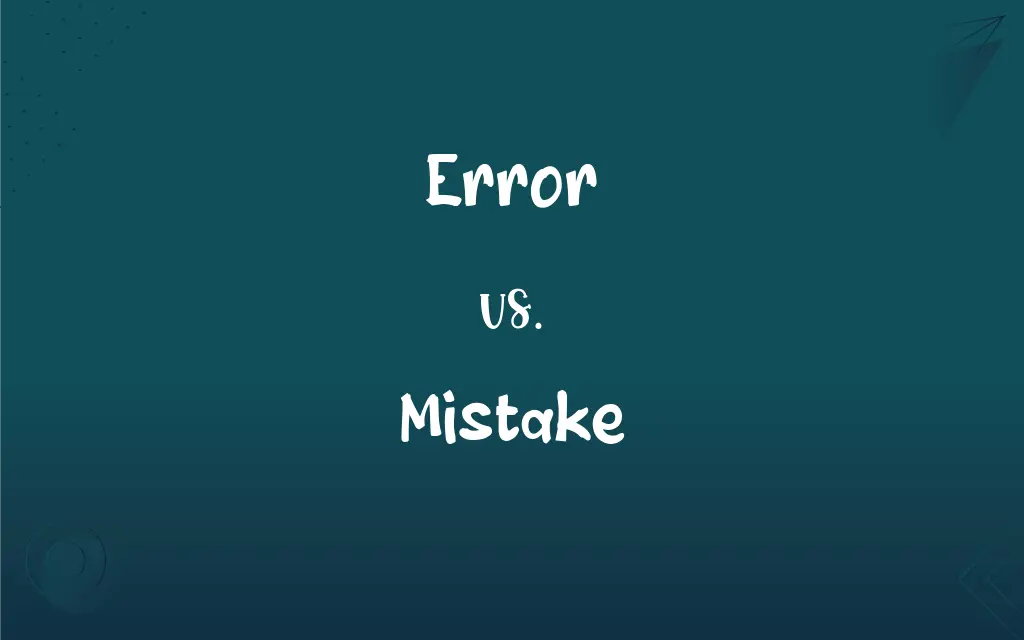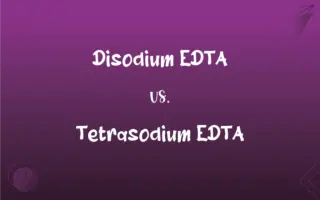Error vs. Mistake: What's the Difference?
Edited by Aimie Carlson || By Harlon Moss || Updated on October 3, 2023
An error is a deviation from accuracy or correctness due to a misunderstanding or misperception, while a mistake is a wrong action or statement arising from poor judgment or carelessness.

Key Differences
An error generally implies a certain level of systemic or inherent faultiness, often originating from misjudgment or misperception, making it somewhat unintentional in nature. On the other hand, a mistake usually emanates from an individual’s incorrect decision or misjudgment, and it's commonly recognized after the action has taken place.
When discussing an error, it’s often perceived as something that can emerge from a malfunction or misconfiguration of a system or a method. Conversely, a mistake often arises from an individual’s actions and may stem from a lack of knowledge, poor decision-making, or inattention.
An error might not always be avoidable, especially when it comes from a system or a process that has intrinsic faults. In contrast, a mistake is generally perceived as avoidable and is typically identified and corrected by the person who commits it.
In various contexts, an error might be seen as more excusable, especially when the individual committing it lacked control over it. A mistake, however, may bear a somewhat heavier connotation, as it is often seen as a lapse in judgment or attention by an individual.
While both error and mistake refer to something being incorrect or wrong, an error might sometimes suggest a need for rectification or adjustment in a system or method. In comparison, a mistake might imply a need for an individual to be more careful or to improve their knowledge or skills.
ADVERTISEMENT
Comparison Chart
Origin
Often arises from systemic or inherent issues
Typically results from individual actions
Avoidability
Might not always be avoidable
Generally considered avoidable
Correction
Might require systemic adjustments
Usually corrected by the individual
Responsibility
Might not always lie with the individual
Generally lies with the individual
Perception
Often seen as less blameworthy
Might be seen as more blameworthy
ADVERTISEMENT
Error and Mistake Definitions
Error
An error refers to a deviation from correctness or accuracy.
The scientist discovered an error in the experimental data.
Mistake
A mistake refers to a fault or wrongdoing arising from carelessness.
The mistake in the document was overlooked by the editor.
Error
An error can suggest the need for rectification or adjustment.
The programmer had to revise the code to fix the error.
Mistake
A mistake encompasses a wrong or incorrect judgment or action.
She made a mistake in solving the math problem.
Error
An error may reflect a systemic malfunction or mishap.
The software displayed inconsistent results due to an error.
Mistake
A mistake can be perceived as a lapse in accurate decision-making.
The manager admitted to making a strategic mistake.
Error
An error can indicate a misjudgment or miscalculation.
The error in the financial report caused a temporary panic.
Mistake
A mistake indicates an inadvertent action that is not correct.
He realized his mistake too late to apologize.
Error
An error might imply a procedural or methodological fault.
The error in the manufacturing process led to defective products.
Mistake
A mistake might convey a failure resulting from lack of knowledge.
Her mistake in the recipe altered the flavor of the dish.
Error
An act, assertion, or belief that unintentionally deviates from what is correct, right, or true.
Mistake
An error or fault resulting from defective judgment, deficient knowledge, or carelessness.
Error
The condition of having incorrect or false knowledge.
Mistake
A misconception or misunderstanding.
Error
The act or an instance of deviating from an accepted code of behavior.
Mistake
To understand wrongly; misinterpret
Mistook my politeness for friendliness.
Error
A mistake.
Mistake
To recognize or identify incorrectly
He mistook her for her sister.
FAQs
How is a mistake commonly defined?
A mistake is typically defined as a wrong or misguided action or judgment, often realized after the fact.
Are errors always preventable?
Not always, errors, especially those systemic or inherent in nature, might not always be preventable.
Can a mistake be unintentional?
While mistakes arise from poor judgment, they’re usually unintentional, as individuals often realize the wrongness post-action.
How is an error commonly identified in computer programming?
In programming, an error might be identified through debugging or when the program fails to run or compile correctly.
What is an error?
An error is a deviation from accuracy, often unintentional, resulting from misperception or misunderstanding.
Is it common to learn from mistakes?
Yes, mistakes are commonly seen as learning opportunities, helping individuals understand what to avoid in the future.
How often are mistakes recognized by the perpetrator?
Mistakes are often recognized by the individual who committed them, especially upon reflection or feedback.
Can errors be beneficial in any context?
In some contexts, identifying errors can be beneficial as it highlights areas for improvement or rectification.
Is making a mistake in public speaking common?
Yes, making mistakes in public speaking, like mispronouncing words or forgetting points, is common and usually due to nervousness or lack of preparation.
Can mistakes be corrected?
Yes, mistakes, once identified, can often be corrected or mitigated through subsequent actions.
Can admitting to a mistake be viewed positively?
Yes, admitting to a mistake can be viewed as honesty and taking responsibility, which are often appreciated.
Can a mistake be deliberate?
Generally, a mistake is not deliberate; if an incorrect action is taken deliberately, it would not typically be labeled a mistake.
How is error handled in mathematics?
In mathematics, error analysis involves evaluating the difference between the approximated result and an exact solution.
Can errors be intentional?
Generally, errors are considered unintentional as they usually stem from misunderstanding or misperception.
Is a mistake considered more personal?
Generally, yes, a mistake is often attributed to an individual’s actions or decisions, making it more personal.
Can an error be a result of systematic issues?
Yes, errors can stem from systematic issues, highlighting faults in an underlying method or system.
Can errors be classified into different types?
Yes, errors can be classified into various types, such as systematic errors, random errors, and gross errors, particularly in scientific and technical contexts.
Are errors in research always detrimental?
Not always. While errors can impact accuracy, identifying them helps enhance the validity of research through correction and adjustment.
How does an error differ in scientific contexts?
In science, an error might refer to a discrepancy between a measured value and the true or accepted value.
Can mistakes lead to innovative discoveries?
Yes, sometimes mistakes can serendipitously lead to new discoveries or innovations by revealing unexpected outcomes.
About Author
Written by
Harlon MossHarlon is a seasoned quality moderator and accomplished content writer for Difference Wiki. An alumnus of the prestigious University of California, he earned his degree in Computer Science. Leveraging his academic background, Harlon brings a meticulous and informed perspective to his work, ensuring content accuracy and excellence.
Edited by
Aimie CarlsonAimie Carlson, holding a master's degree in English literature, is a fervent English language enthusiast. She lends her writing talents to Difference Wiki, a prominent website that specializes in comparisons, offering readers insightful analyses that both captivate and inform.































































